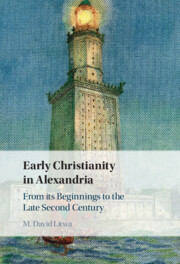Book contents
- Early Christianity in Alexandria
- Early Christianity in Alexandria
- Copyright page
- Dedication
- Contents
- Tables
- Acknowledgments
- Note on the Text
- Abbreviations
- Introduction
- Part I Beginnings
- Part II Early Christian Teachers and Movements in Alexandria
- 6 The Earliest Alexandrian Theologians
- 7 Eugnostus and the Wisdom of Jesus Christ
- 8 Julius Cassianus and Alexandrian Ascetic Culture
- 9 Valentinian and Marcionite Currents
- 10 The Naassene Preacher
- Conclusion
- Bibliography
- Index
10 - The Naassene Preacher
from Part II - Early Christian Teachers and Movements in Alexandria
Published online by Cambridge University Press: 14 December 2023
- Early Christianity in Alexandria
- Early Christianity in Alexandria
- Copyright page
- Dedication
- Contents
- Tables
- Acknowledgments
- Note on the Text
- Abbreviations
- Introduction
- Part I Beginnings
- Part II Early Christian Teachers and Movements in Alexandria
- 6 The Earliest Alexandrian Theologians
- 7 Eugnostus and the Wisdom of Jesus Christ
- 8 Julius Cassianus and Alexandrian Ascetic Culture
- 9 Valentinian and Marcionite Currents
- 10 The Naassene Preacher
- Conclusion
- Bibliography
- Index
Summary
This chapter analyzes the Naassene discourse as excerpted by the author of the Refutation of All Heresies (about 222 ce). After arguing for the Naassene Preacher’s Alexandrian provenance, it expounds what he can tell us about the character of Christianity in late second-century Alexandria. The Preacher tried to cultivate a mentality that was both universalistic and exclusive. His group of self-identified knowers (“gnostics”) had their own rites (baptism and anointing), a leadership structure, a communal gathering (a setting for rituals), an exegetical practice, and a common aim: to transcend the flesh while living in it, to be angelic even on earth. The Preacher belonged to a wider circle of celibacy-promoting Christian intellectuals in late second-century Alexandria. What is new is the combination of sexual rigorism with a daring cosmopolitan attitude toward other religious cults and ideas. The Preacher’s profound openness to and ability to transform Hellenized traditions best parallels the work of Clement of Alexandria.
- Type
- Chapter
- Information
- Early Christianity in AlexandriaFrom its Beginnings to the Late Second Century, pp. 150 - 167Publisher: Cambridge University PressPrint publication year: 2023

